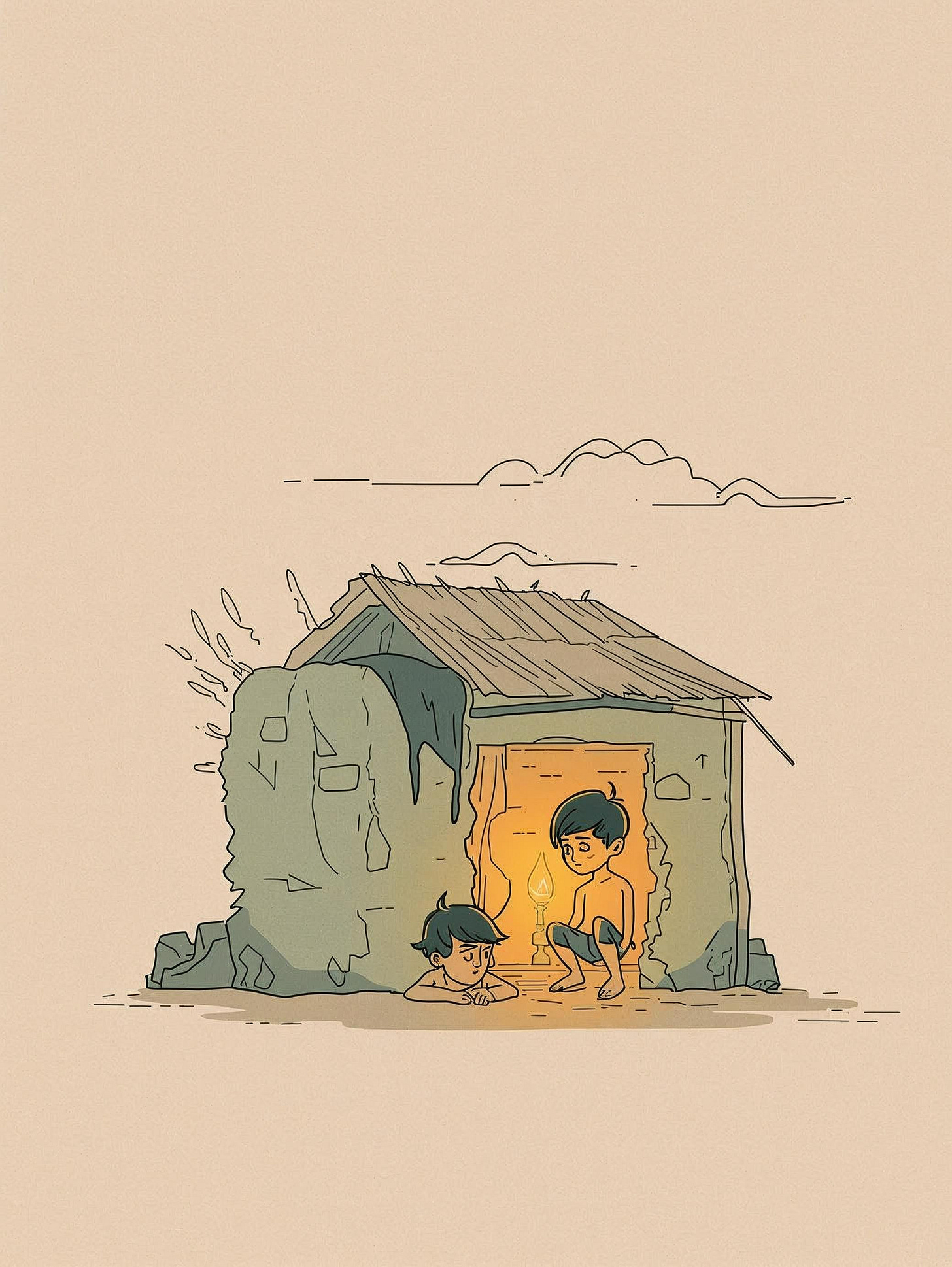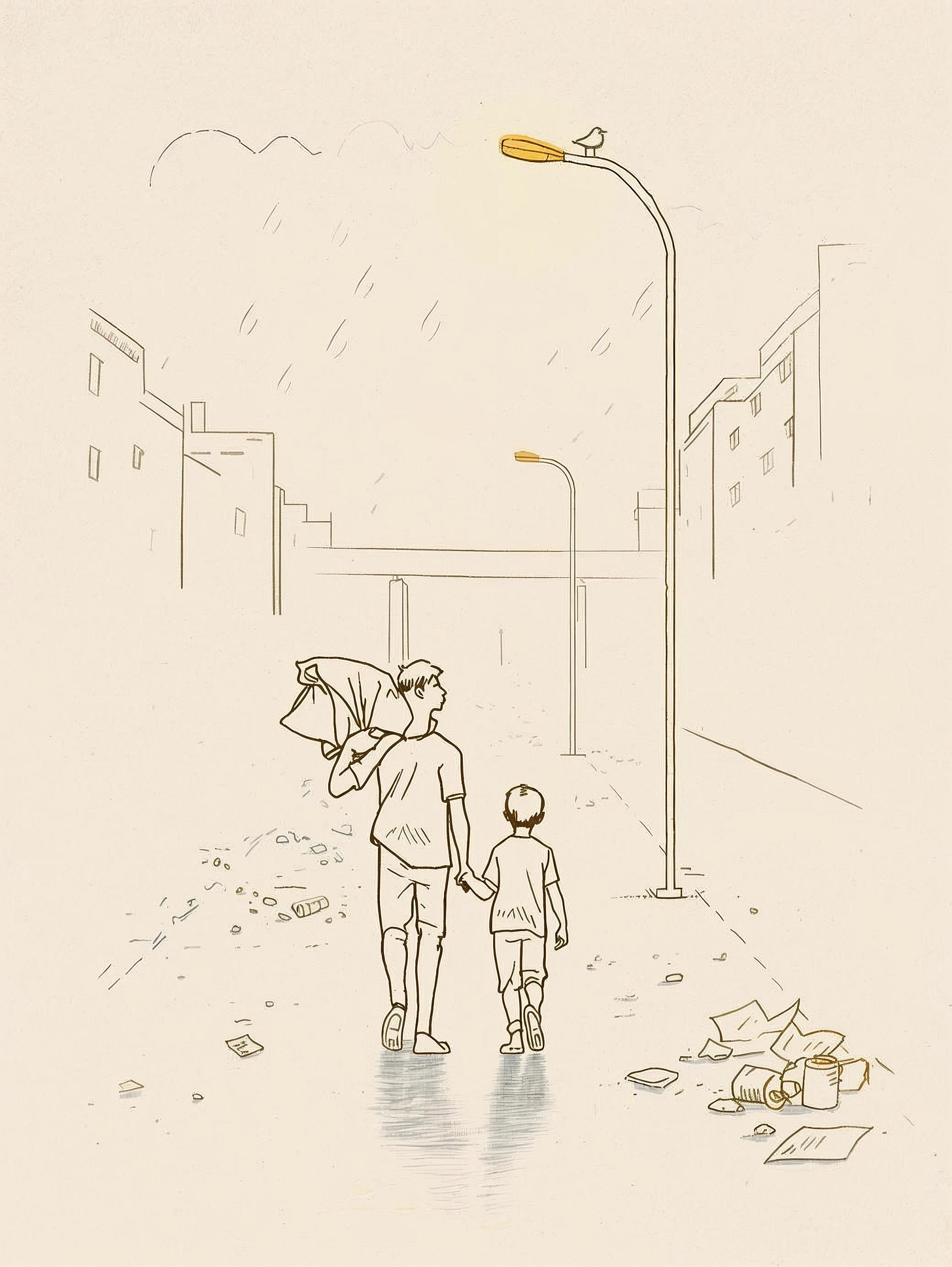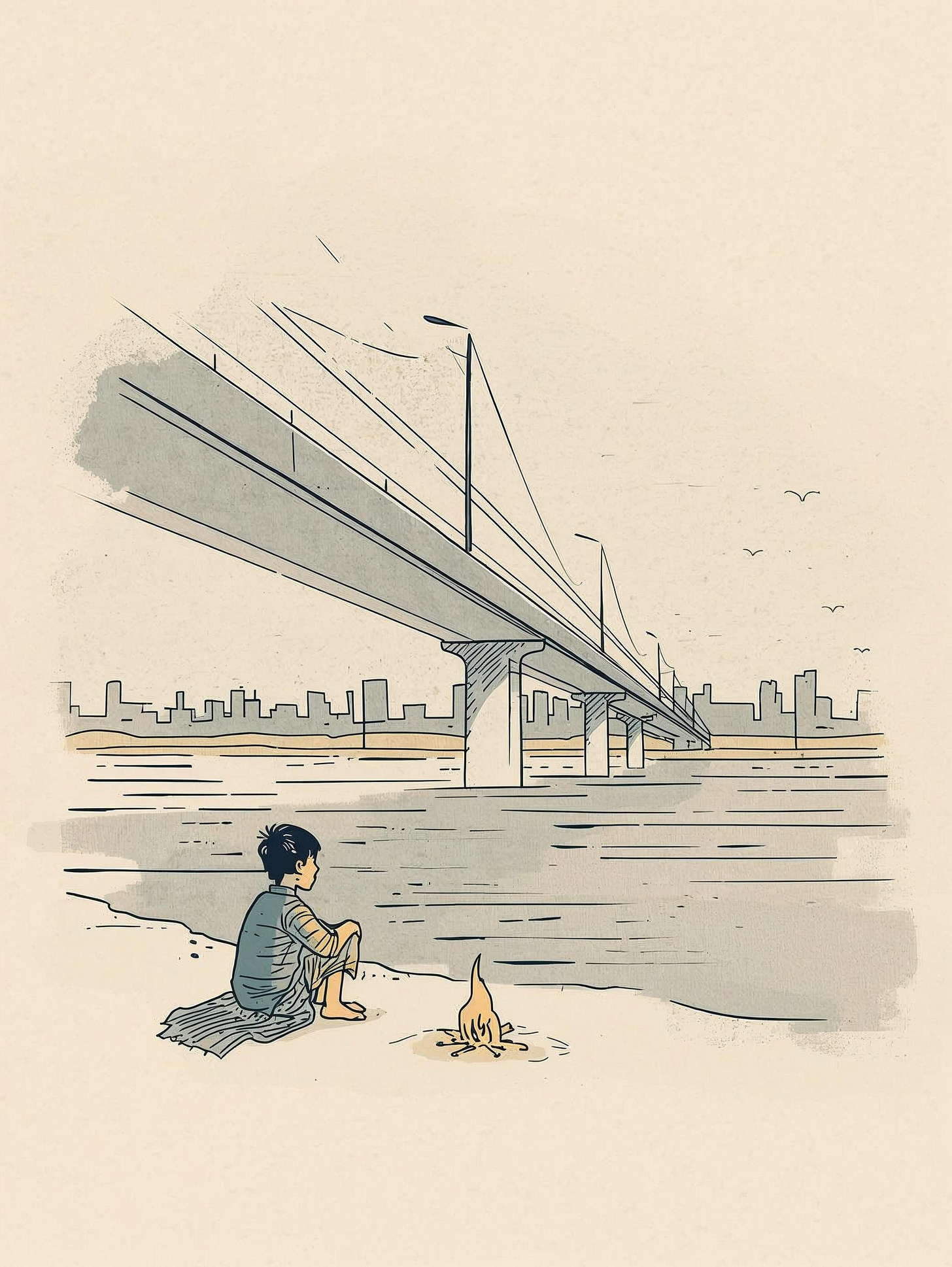The Weight of a Rag Sack
A poetic short story by Roshan Tara that follows two young brothers, Dipu and Naru, as they escape an abusive home only to face the unforgiving streets of the city. Told in a lyrical, image-rich style
Dipu was eight, but his eyes carried the weight of years no child should bear. He knew the sour sting of his father’s liquor-soaked breath before he ever smelled the pages of a book. The cracks in the mud walls of their village hut were his first map—etched in his mind long before he ever held a pencil.
His brother, Naru, was seven—small and fragile, with a grin that flickered like a candle in a storm. He’d hum little songs he made up—nonsense tunes about birds and rivers—even when his stomach growled louder than his voice. Those songs were Dipu’s anchor, a soft thing in a world of sharp edges.
Their home wasn’t really a home—just a sagging thatch roof, patched with plastic and prayers. Their father drank away what little they had, his fists louder than his words. Their mother, wiry and worn, broke her back in others’ fields from dawn to dusk, returning with blistered hands and coins that vanished into bottles. Laughter was a stranger. Screams were family.
One night, when the shouting shook the walls and hunger gnawed at their insides, Dipu made a choice.
“We’re leaving,” he whispered to Naru, who was curled up on their shared mat, humming faintly. “We’ll go to the city. Find work. Eat.”
Naru’s eyes, bright despite the dark, met his.
“Will there be mangoes?” he asked, voice small but hopeful.
Dipu forced a smile.
“Mangoes every day.”
Naru nodded and slipped his hand into Dipu’s—trusting, like only a little brother can.
The city hit them like a slap. Towering concrete. Honking horns. Crowds that swallowed them whole. That first night, they slept beneath a flyover, the cold biting their bones, the screech of tires jolting them awake. Dipu held Naru close, his brother’s hums nearly drowned by the city’s roar.
By morning, Dipu dragged Naru from shop to shop, begging for work.
“No child labor,” they heard, again and again—from men who didn’t look them in the eye.
Hunger bit deeper than rejection.
By afternoon, a boy named Teju same as Dipu found them. His grin was sharp and knowing, his hands calloused like a grown man’s.
“Looking for work?” he asked, eyeing their torn slippers and emptier hands.
“Anything,” Dipu said, voice steady despite the tremble in his knees.
Teju led them to the city’s underbelly, where trash was treasure.
“Pick rags,” he said. “Paper, plastic, metal. Fill sacks. Sell by the kilo.”
He showed them how to dodge broken glass, how to tell what scraps paid best. It was filthy—chemicals that burned their skin, smells that clung to their hair, cuts that turned to sores. But it was money. A few rupees for stale bread. A half-rotten banana. Enough to keep Naru’s hums alive, if only barely.
They settled in a slum by a stinking drain, beneath a plastic sheet that pretended to be a roof. No water. No toilets. Just flies, filth, and children with nowhere else to be.
The city loomed around them—its glittering lights mocking their patched clothes, its food stalls taunting their hunger. Dipu learned the rhythms: the clatter of trains, the vendors’ cries, the way nightfall felt heavier than daylight.
Days bled into weeks. Months blurred.
Naru grew quieter. His songs faded, replaced by a cough that rattled through his bones. His cheeks hollowed, his eyes dulled, but he still tried to smile.
“We’ll get mangoes soon, right?” he whispered.
Dipu nodded, though fear sat heavy in his gut. No money for doctors. No papers for hospitals. No help for boys like them.
One morning, Naru didn’t wake.
Dipu shook him, heart pounding.
“Naru, wake up. Get up.”
He pressed his ear to his brother’s chest, desperate for a heartbeat, a hum, a breath. Anything.
But Naru was still. Cold. His small body silent.
The city didn’t pause. The drain still stank. The horns still screamed. Life moved on like it hadn’t just stolen a child.
Teju helped—slipping Dipu a few crumpled notes. A small fire by the river. No priest. No flowers. Just ashes. Just loss.
Dipu didn’t cry.
Tears were a luxury. Like mangoes.
He couldn’t go home—not without Naru’s hand in his.
So he stayed. Rag sack heavier each day. Shoes worn to shreds. The city’s lights dimmed in his eyes. The noise became a hum of absence.
At night, beneath the flyover, he’d whisper, “Naru, I’m still here.”
The wind carried his words away.
But he kept picking rags.
Kept moving.
A boy with no childhood.
In a world with no place for children like him.
Author’s Note:
Ragpickers like Dipu are the invisible hands that keep our cities clean—children sorting through filth to survive. They are not stories. They are real. They are here.
But they are unheard.
Pity isn’t enough. What they need is action—education, healthcare, identity, safety. And above all, a system that sees them. Not as waste-pickers. But as children.
Let’s not leave them beneath the bridges we cross every day.
Author’s Bio:
My name is Roshan Tara, and I am an aspiring writer based in Delhi. I originally pursued a career in medicine as a NEET aspirant, but after facing multiple setbacks and personal challenges, I went through a period of deep reflection and recovery.
With the support of therapy and my family, I found healing—and eventually, a new purpose in writing. I began writing one month ago, and since then, it has become not just a creative outlet but a path toward rebuilding my identity and career.
I have a deep love for books and storytelling, and I am now working towards establishing myself as a writer. I am eager to grow, learn, and contribute meaningfully through my words.
Email ID: tararoshan35@gmail.com
If you’re a writer who cares and has a story to tell, we’d love to hear from you!
Send your written pieces to thechaitrail@gmail.com—whether it’s a poem, editorial, journal entry, photo essay, blog, or any other form of writing.
Here are some topics you can explore:
The rich diversity of vernacular art and crafts.
Stories of living harmoniously with nature.
Perspectives advocating empathy, equality, and kindness for all beings.





